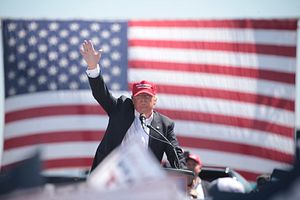President-elect Donald Trump did not spend a lot of time outlining his thoughts on U.S. policy in Asia during the presidential campaign. To the extent that he has addressed U.S. policy towards Asia over the last 18 months, it has been focused on criticizing U.S. allies, an incoherent China policy, and revealing a casual disregard for the consequences of the proliferation of nuclear weapons in Asia. None of this is comforting.
This week, we may see the first hints of where Mr. Trump will take U.S. policy in Asia when he meets with Japanese Prime Minister Shinzo Abe on Thursday—Trump’s first face-to-face meeting with a foreign leader since the election. He has lots of questions to answer, and quickly.
First, will Trump reaffirm America’s rock solid commitment to its treaty allies in Asia? During the campaign, Trump repeatedly criticized U.S. allies—including Japan, South Korea, and NATO—raising serious questions about whether he would uphold U.S. treaty commitments. Security in Asia rests largely on U.S. alliances that have been in place since the end of World War II. With a growing threat from North Korea and concerns about China’s regional ambitions, U.S. alliances are more important than ever. Prime Minister Abe will be looking for strong reassurance from Mr. Trump about the U.S. commitment to Japan, while U.S. allies across the world will be looking to see what signals the president-elect sends during his first meeting with a U.S. ally.
Second, Trump must establish his policy to prevent North Korea from further advancing its nuclear and missile programs. Mr. Trump’s comments on North Korea during the campaign ranged from a willingness to talk to pushing China to pressure North Korea to suggesting that Japan acquire nuclear weapons to deter North Korea. With concerns growing over North Korea’s illicit programs in the wake of multiple nuclear and missile tests in the last year alone, Trump will need to make clear to Abe how he intends to steer U.S. policy on North Korea and use the meeting to send a public signal about those intentions. New administrations are often tested by foreign policy challenges, and North Korea could be one of those tests.
Third, Mr. Trump must make clear publicly that the United States remains a steadfast opponent of nuclear proliferation. At the most basic level, the commitment of Asia’s major players to non-proliferation is a shared goal—even if countries disagree on the tactics sometimes. If Mr. Trump does not make clear his commitment to this goal, then Asia could begin to question the most fundamental tenets of regional security.
Fourth, Trump must also make clear what his trade policy will actually look like. Trade was a dominant campaign theme for Mr. Trump, but details were sparse as Trump simply claimed that he could negotiate better deals. With the Trans-Pacific Partnership trade deal apparently going nowhere, Trump will quickly have to make clear to countries in Asia what the new U.S. trade policy consists of. The manner in which Trump approaches trade relationships with key U.S. allies and partners who invested significant energy in negotiating the TPP deal with the U.S.—including Japan—will be vital to maintaining trust in those relationships (not to mention to actually beginning to craft policies that will help American workers and businesses remain competitive in one of the world’s fastest growing regions).
Fifth, Trump must outline what kind of a relationship with China his administration plans to pursue. Trump’s campaign rhetoric was filled with threats of harsh trade and economic repercussions against China in response to China’s economic policies. But Trump has veered back and forth between criticizing China’s policies on economics, North Korea, and the South China Sea while also suggesting that he would be able to persuade China to change course by using “trade to negotiate.” It will be important for Mr. Trump to begin developing a coherent policy approach to China and begin sending consistent signals to U.S. friends and allies.
Finally, Mr. Trump will need to overcome his stated disdain for predictability. Trump has repeatedly criticized how predictable the United States is in foreign policy, once stating, “There’s such, total predictability of this country, and it’s one of the reasons we do so poorly.” This is a dangerous attitude. While some ambiguity with adversaries can help provide leverage, the United States needs to be clear and consistent about its interests and policies to deter adversaries and to encourage allies and friends to stand up for those shared interests. Especially with allies like Japan, the United States needs to be predictable. Anything but is a threat to the United States, and to global security.
The people of the United States are looking for signals that president-elect Trump will uphold the responsibility of the U.S. government to keep the American people safe, and the people of the world are looking for signs that the United States will continue to uphold its global commitments to security. Trump needs to start sending those signals now.
Michael H. Fuchs is a Senior Fellow at the Center for American Progress, and most recently was a Deputy Assistant Secretary of State for East Asian and Pacific Affairs.

































